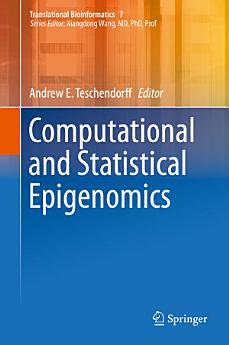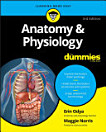Computational and Statistical Epigenomics
Andrew E. Teschendorff
মে’ ২০১৫ · Translational Bioinformatics কিতাপ 7 · Springer
ইবুক
217
পৃষ্ঠা
reportমূল্যাংকন আৰু পৰ্যালোচনা সত্যাপন কৰা হোৱা নাই অধিক জানক
এই ইবুকখনৰ বিষয়ে
This book introduces the reader to modern computational and statistical tools for translational epigenomics research. Over the last decade, epigenomics has emerged as a key area of molecular biology, epidemiology and genome medicine. Epigenomics not only offers us a deeper understanding of fundamental cellular biology, but also provides us with the basis for an improved understanding and management of complex diseases. From novel biomarkers for risk prediction, early detection, diagnosis and prognosis of common diseases, to novel therapeutic strategies, epigenomics is set to play a key role in the personalized medicine of the future. In this book we introduce the reader to some of the most important computational and statistical methods for analyzing epigenomic data, with a special focus on DNA methylation. Topics include normalization, correction for cellular heterogeneity, batch effects, clustering, supervised analysis and integrative methods for systems epigenomics. This book will be of interest to students and researchers in bioinformatics, biostatistics, biologists and clinicians alike.
Dr. Andrew E. Teschendorff is Head of the Computational Systems Genomics Lab at the CAS-MPG Partner Institute for Computational Biology, Shanghai, China, as well as an Honorary Research Fellow at the UCL Cancer Institute, University College London, UK.
এই ইবুকখনক মূল্যাংকন কৰক
আমাক আপোনাৰ মতামত জনাওক।
পঢ়াৰ নির্দেশাৱলী
স্মাৰ্টফ’ন আৰু টেবলেট
Android আৰু iPad/iPhoneৰ বাবে Google Play Books এপটো ইনষ্টল কৰক। ই স্বয়ংক্রিয়ভাৱে আপোনাৰ একাউণ্টৰ সৈতে ছিংক হয় আৰু আপুনি য'তে নাথাকক ত'তেই কোনো অডিঅ'বুক অনলাইন বা অফলাইনত শুনিবলৈ সুবিধা দিয়ে।
লেপটপ আৰু কম্পিউটাৰ
আপুনি কম্পিউটাৰৰ ৱেব ব্রাউজাৰ ব্যৱহাৰ কৰি Google Playত কিনা অডিঅ'বুকসমূহ শুনিব পাৰে।
ই-ৰীডাৰ আৰু অন্য ডিভাইচ
Kobo eReadersৰ দৰে ই-চিয়াঁহীৰ ডিভাইচসমূহত পঢ়িবলৈ, আপুনি এটা ফাইল ডাউনল’ড কৰি সেইটো আপোনাৰ ডিভাইচলৈ স্থানান্তৰণ কৰিব লাগিব। সমৰ্থিত ই-ৰিডাৰলৈ ফাইলটো কেনেকৈ স্থানান্তৰ কৰিব জানিবলৈ সহায় কেন্দ্ৰত থকা সবিশেষ নিৰ্দেশাৱলী চাওক।







